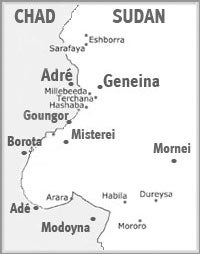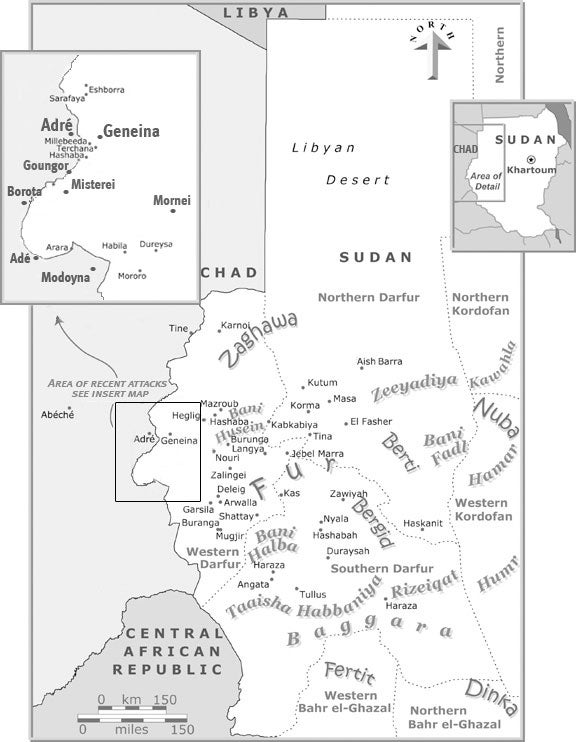(New York)- Militias based in Darfur are launching cross-border raids on villages in Chad on an almost daily basis, killing civilians, burning villages, and stealing cattle in a pattern of attacks that show signs of ethnic bias, Human Rights Watch said today.
Human Rights Watch researchers documented numerous cross-border attacks on Chadian villages along the border between Adré, Adé, and Modoyna in eastern Chad since early December 2005. Most of the attacks were by Sudanese and Chadian militiamen from Darfur, some with apparent Sudanese government backing, including helicopter gunship support.
Tens of thousands of people are now displaced internally within Chad by the violence. Most of the victims are from the Dajo and Masalit ethnic groups, which live on both sides of the international border. Chadian Arabs living in the same area appear to enjoy immunity from attack, although some have left their homes and taken refuge in Sudan, apparently for fear of reprisals.
Human Rights Watch also documented a new influx into Chad of refugees from Darfur, people already displaced by attacks in Darfur in 2003 who had been living in the Mornei and Misterei camps in West Darfur. Many of these people said that they fled to Chad to escape continuing attacks on the camp residents by the Sudanese government-sponsored Janjaweed militia.

See below for full size map.
“You may have thought the terrible situation in Darfur couldn’t get worse, but it has,” said Peter Takirambudde, executive director of the Africa division at Human Rights Watch. “Sudan’s policy of arming militias and letting them loose is spilling over the border, and civilians have no protection from their attacks, in Darfur or in Chad.”
Human Rights Watch said that the situation had increased the need for an expanded, robust international force not only in Darfur but along the Chadian border, with a mandate to protect civilians and disarm the armed groups.
Earlier this week, Human Rights Watch called on the U.N. Security Council to authorize, on an urgent basis, a transition of the African Union force in Darfur to a U.N. mission. That mission should have a strong and clear mandate to protect itself and civilians by force if necessary, and to disarm and disband the Sudanese government-sponsored militia forces that have confiscated land or threaten the civilian population.
The border area south of Adré became more vulnerable to militia attacks following a December 18, 2005 attack on Adré by Chadian rebels opposed to the government in N’Djamena. The Chadian rebels operate from bases in Darfur and are allegedly supported by the Sudanese government. The attack on Adré prompted the Chadian government to redeploy its forces away from border villages south of the town, leaving large areas at the mercy of uniformed militiamen riding horses and camels who have attacked and looted dozens of villages in the past six weeks.
The increasing attacks on villages in Chad, as well as on camps and aid workers in West Darfur in the past few months, have made the region extremely dangerous for international humanitarian groups. Therefore, only a few are currently operating in the border area.
Many of the people displaced in Chad lost most of their harvest and cattle as a result of the attacks, and are living in makeshift straw huts, dependent on handouts from host villagers. Food shortages may become critical in the coming weeks as food stocks are depleted.
“Security in Eastern Chad and West Darfur are closely interconnected. If no preventive action is taken it may only be a matter of time before the refugee camps in Chad are also threatened,” said Takirambudde. “The Security Council must act at once to prevent more Chadian civilians from suffering the nightmare next door.”
Human Rights Watch researchers in the Chadian region of Borota, south of Adré, documented several attacks by Janjaweed militia since mid-December. Forty of the 85 villages comprising Borota have been attacked, and all forty have been abandoned by villagers, who are now homeless. In several attacks between December 16 and January 20, sixteen villagers were killed and six were wounded. The latest attack, on January 20, occurred at night while Human Rights Watch researchers were staying in the village. One villager was injured by gunfire.
The central village of Borota has a population of 6,850, but since the attacks began, it has swollen to more than 10,000. The village has only one working well and food stocks are severely depleted.
Dozens of witnesses, who were interviewed separately, described the attackers as ethnic Arabs visibly different from the local population, wearing Sudanese army khakis and speaking Sudanese Arabic. They wore green, white, or yellow turbans, rode horses or sometimes camels, and came from over the Sudan border to the east.
Approximately 10,000 people from twenty-six border villages have sought refuge in Koloy, a village 45 kilometers southeast of Adé that normally has a population of 1,904. A majority of the displaced arrived since mid-December, when Janjaweed raids increased in frequency. Victims interviewed by Human Rights Watch in Koloy said that recent militia raids have reached the edge of the village. Individuals who have returned to the border areas to recover food from their fields report being attacked; many fear that they will go hungry if they continue to be denied access to their villages.
Human Rights Watch researchers also documented an attack by Sudanese army forces on the region of Goungor, about 45 kilometers south of Adré, in early December. Between December 5 and 11, the region of 8,315 inhabitants was attacked on four separate occasions, the first two times by Sudanese army and Janjaweed forces, and the next two times by the Janjaweed alone.
At first villagers believed that the Sudanese forces were pursuing Darfur rebels who had retreated to Goungor after skirmishes in Darfur. But the soldiers and Janjaweed directly attacked civilians in twenty-two villages in the Goungor area. At least two individuals were confirmed dead from the attacks. Although Human Rights Watch was told that a total of forty-five people were killed, that number could not be verified.







